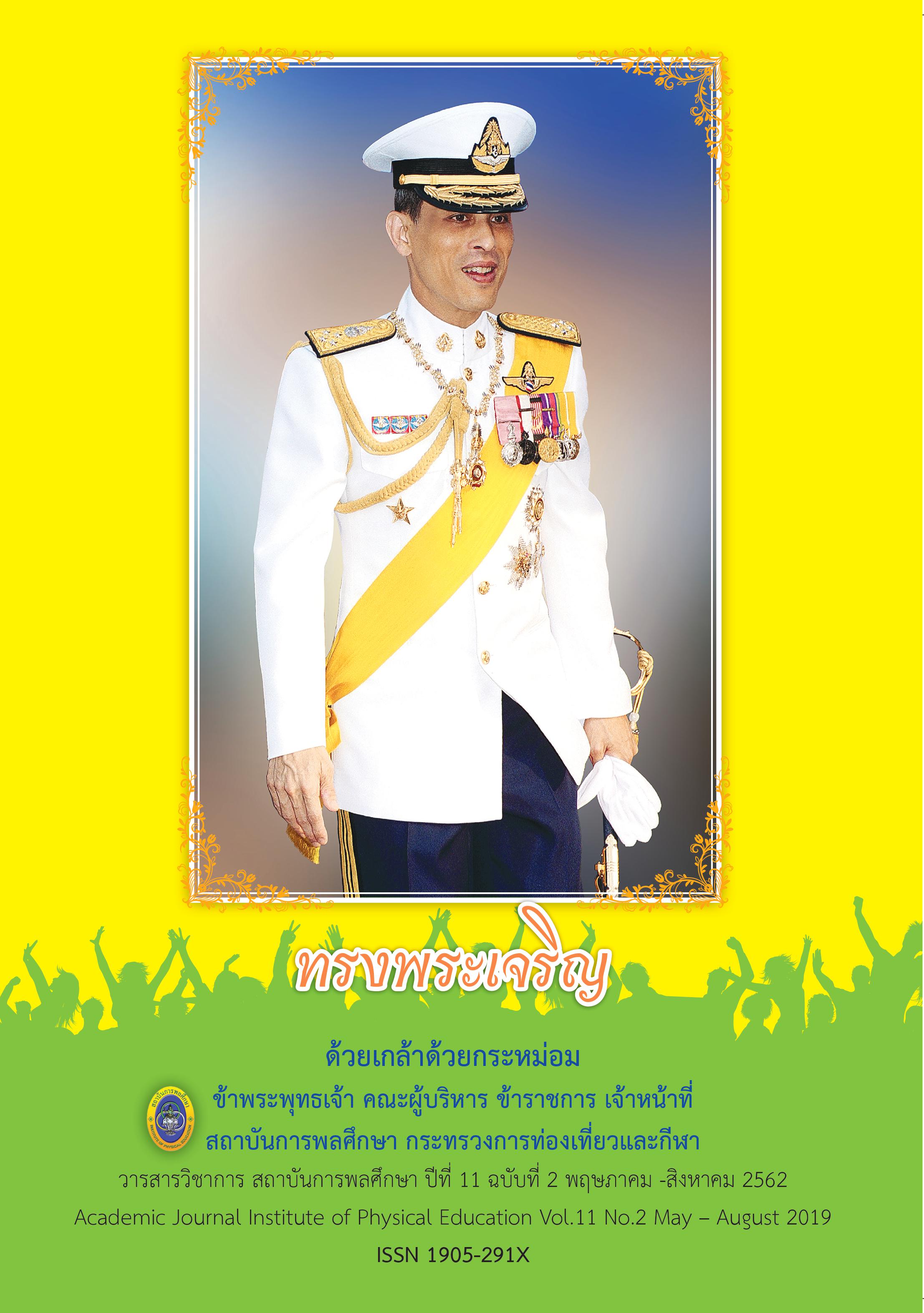GUIDELINES FOR MANAGING SPORT CLUB OF UNIVERSITY OF PHAYAO
Main Article Content
Abstract
The purpose of this research were to study the state of problem and to investigate guidelines for managing sport club of University of Phayao. The methodology of this research comprised of four steps; 1) reviewing the literature by synthesizing related documents research and experts in-depth interview to consider guidelines for managing sport club of University of Phayao, 2) summarize the results of experts interview to create a questionnaire with content
validity 1.0, and reliability 0.95, 3) the data collection and data analysis by using mean and standard deviation of 258 persons, 4) the acceptability of sport guideline management was considered by the focus group of the stakeholder.
The research findings were as follow:
1. The problem of management the sport clubs of University of Phayao found that overall problem were in high level. Considering by aspects, it was found that 1) the planning (= 3.70), 2) the organizing (
= 3.66), 3) the controlling (
̄ = 3.65) and 4) the leading (
= 3.64).
2. The guidelines for managing sport club of University of Phayao, according to management process were; 1) planning should set goals, objectives and development planning by survey the needs of students and the results of activities last year were the basis for improvement and development, 2)organizing should schedule the responsibility structure to professionals (i.e knowledge and skill) and obvious role for every person in each activity both inside and outside the university, 3)leading is the division of the students’ affaire decentralize sport clubs to conduct planning and to use budget for activities and publicize the honor of student who make reputation of sport for the university, and 4) controlling is to evaluate the activities to cover the sport objectives for health and excellence and to achieve the objectives of the sports club.
Article Details
The published article is a copyright of the Academic Journal of Thailand National Sports University. The passage appeared in each article in this academic journal is a perspective of each author which is not related to the journal. Each author is required to be responsible for all components of his/her own article. If there are any mistakes, each author must be responsible for those mistakes on his/her own.
References
Boontawee, N. (2016). Management Guideline for Effective Student’s Sport Club in Burapha University. Master of Science (Exercise and Sport Science), Faculty of Sport Science, Burapha University. [in thai].
Chanalithichai, J., Chingtin, S., Inprom, P., & Pitakwong, S. (2012). A Study of The Stadium Management of Phare Provincial Administration Organization. Journal of Education Naresuan University, 14(2), May-August 2012. [in thai].
Chounbun, P. (2011). The implementation of exercise promotion policy in Samutsakorn Provincial Administrative Organization. Academic Services Journal, Prince of Songkla University, 22(2), May-August, pp. 17-31. [in thai].
Division of Student Affairs. (2017). Stratergic Plan for Division of Student Affairs 2015–2018. University of Phayao. [in thai].
Ekakun, T. (2000). Research methodology in behavioral sciences and social sciences. Ubon: Ubon Ratchathani Rajabhat University. [in thai].
Kansing, P. (2009). Management models of a Sport for all Program in The University. Doctor of Philosophy (Exercise and Sport Science), Faculty of Sport Science, Burapha University. [in thai].
Ministry of Education. (1999). National Education Act 1999. Bangkok: Kurusapa Printing Ladphrao. [in thai].
Ministry of Tourism & Sport. (2012). Ministry of Tourism & Sport Strategic Plan (2012-2016). Retrieved November 30, 2017, from http://www.mots.go.th/ewt_dl_link.php?nid=7100. [in thai].
Ministry of Tourism & Sport. (2017). The National Sports Development Plan No.6. Retrieved November 30, 2017, from http://www.mots.go.th/ewt_dl_link.php?nid=8408. [in thai].
Office of the National Economic and Social Development Council. (2011). The Eleventh National Economic and Social Development Plan (2012-2016). Retrieved October 20, 2017, from http://www.nesdb.go.th/Portals/0/news/plan/p11/plan11.pdf. [in thai].
Samahito, S., Phattharophat, W., Piromkham, B., Tientong, A., and Sriyapai, U. (2001). Management models of a Sport for all Program: A Case Study for Kasetsart University. Bangkok: Sport Science Research and Development Center. [in thai].
Sawangmek, T. (2015). A Study of Sport Management for Health Promoting of Students in the State Institutions of Higher Education. Journal of Education Naresuan University, 17(3), July-September 2015, pp. 88-89. [in thai].
Serirat, S., and Hiranyakiti, S. (2002). Organization and Management. Bangkok: Thamsan. [in thai].
Sisaat, B. (2011). Introduction to Research (9th ed). Bangkok: Suweeriyasan. [in thai].
Sriarj, S. (2016). Development of Management Guidelines to Promote Bicycles for Residential Student and Saffs at Burapha University. Master of Science (Exercise and Sport Science), Faculty of Sport Science, Burapha University. [in thai].
Suksriwong, S. (2011). Management: from the executive’s viewpoint. Bangkok: GP Cyberprint. [in thai].
Tangsujjapoj, S. (1997). Knowledge about Physical Education and Recreation. Bangkok: Mittrapap Karnpim and Studio. [in thai].
Tiaotraku, A. (2013). Study of Problems, Corrective Measures, and Guidelines for Developing Sport Club Management of Undergraduate Students in Naresuan University. Journal of Education Naresuan University, 5(4), October - December 2015, pp. 105-113. [in thai].
UNESCO. (2015). International Charter of Physical Education Physical Activity and Sport. Retrieved from http://unesdoc.unesco.org/images/0023/002354/235409e.pdf.


